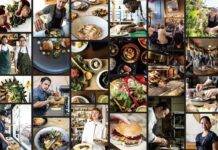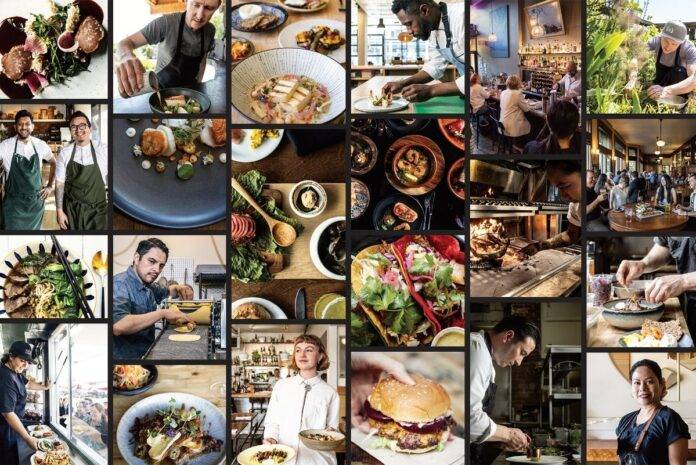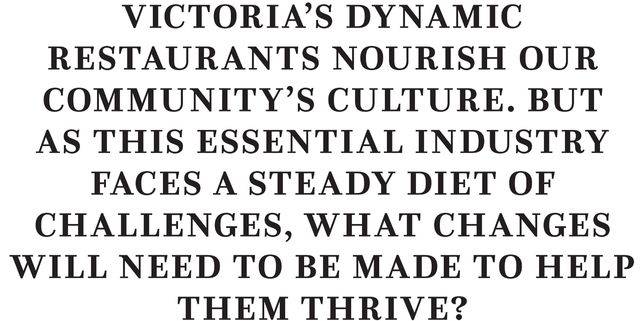
You want easy? Don’t buy or open a restaurant. But if you’re tenacious with some business savvy, love good food and enjoy creating a memorable dining experience, then maybe being a restaurateur is the perfect fit.
A strong stomach for hard work, long hours and uncertainty also helps, says chef Sam Harris, who co-owns Cafe Brio with business partner Vincent Vanderheide. In March, the duo bought Brasserie L’Ecole, which had been teetering financially. Harris calls the purchase a natural fit for their small but growing hospitality company, Vinuel Restaurant Group.
“It’s a beautiful space, I love the style, and I love the country cooking,” says Harris, who vows to follow the same standard as established at Cafe Brio, where “we bring a love and passion for hospitality and great local ingredients, and great staff who give people a really special experience.”
Harris’s enthusiasm for his chosen vocation is obvious the moment he starts talking about food and hospitality. And so is his optimism, despite the daunting challenges facing restaurateurs. In addition to buying Brasserie L’Ecole, Harris and Vanderheide are cooking up plans for a new pizzeria at a yet undisclosed location and projected launch time.
As it turns out, passion and optimism are essential ingredients for an industry that has been fed an oversized portion of challenges in recent years.
Pandora’s Box
Restaurants Canada reported that B.C.’s restaurant industry shed 11,000 jobs between September 2023 and September 2024, with 70 per cent of restaurants reporting fewer guests and 81 per cent with lower profits over the same 12-month period. A Pandora’s box of challenges is behind this troubling trend, including the cost of food which, according to Statistics Canada, was up four per cent year-over-year as of April 2025.
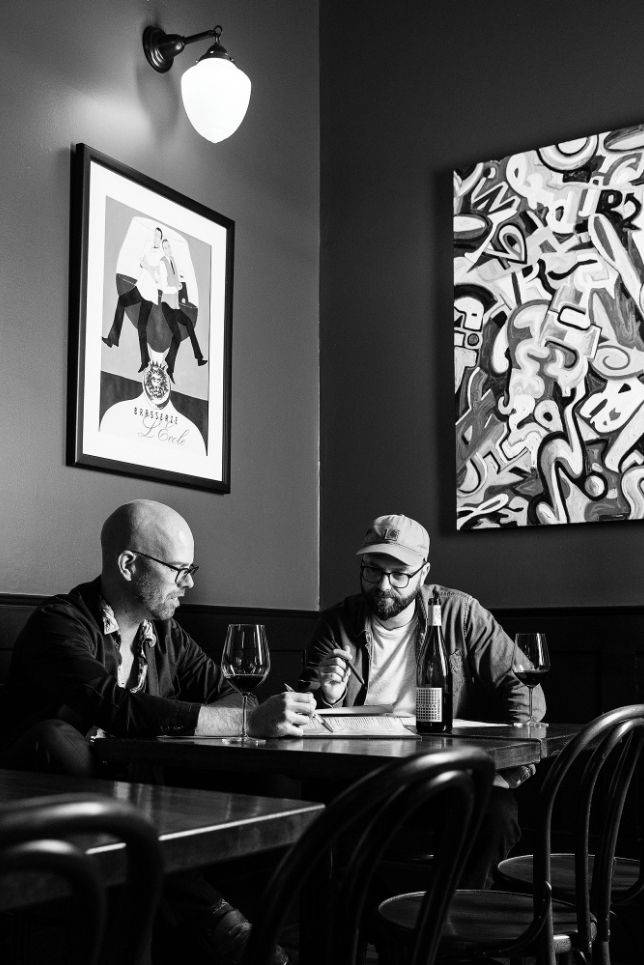
The drop in employment doesn’t tell the whole story. Many restaurants have been hit hard by a tightening of the federal Temporary Foreign Worker Program, which cut off a pipeline of skilled foreign kitchen staff. The problem is that domestic workers aren’t lining up to fill the vacancies. Restaurants Canada also highlights some particularly made-in-B.C. challenges, namely skyrocketing rents and leases that not only squeeze restaurant owners, but add to recruitment challenges.
Then there’s the perennial complaint of long and confusing wait times for permits and licences for outdoor patios, outdated liquor laws and sometimes overzealous and punitive bylaw enforcement. Add to that the crime, poverty and public-safety issues plaguing many of B.C.’s urban centres that often land on the doorstep of downtown restaurants and cafés, and it’s enough to push some owners to the breaking point. And it’s not an insignificant industry. Restaurant and food service companies employ almost 180,000 people provincewide and generate $18 billion in sales annually, representing the third largest sector in the B.C. economy.
“It’s hard right now. Consumer behaviour has changed. People aren’t going out as much and they’re not spending as much,” B.C. Agriculture and Food Minister Lana Popham — the province’s point person for the restaurant industry — said in an interview with Douglas magazine. “Restaurants are vital socially and culturally to our communities and we have to make sure they succeed.”
Pandemic Hangover
In October 2024, Victoria won the nod as the best small city in the world for the second consecutive year in the Condé Nast Traveler Readers’ Choice Awards. Despite this accolade, Victoria’s restaurant scene is feeling the pain. After 11 years of operation, Little Jumbo closed that same month, citing a crushing 40-per-cent jump in rent as the reason. Among several other closures, this past spring YAM magazine’s 2024 Chef of the Year Clark Deutscher sold Hanks and closed Nowhere, popular sister restaurants with loyal followings thanks to Deutscher’s strong emphasis on locally sourced ingredients. (He has since opened Unicorn Sparkles in the former Nowhere location.)
Stories about restaurants closing and others that are for sale with few buyers kicking the tires are getting a lot of attention these days. Ian Tostenson, president and CEO of the BC Restaurant and Foodservices Association, agrees with Harris that the restaurant biz is always challenging. Dining out is a discretionary income choice, and when consumer confidence is low and inflation is high, a trip to a restaurant is one of the first things people cut from the budget. However, he calls the current situation abnormal.
It’s like a bad hangover from the pandemic. First restaurants, forced to close due to COVID-19 health protocols in March of 2020, lost a freezer full of revenue while still having to pay the rent. Many restaurants took on debt to stay afloat. Federal government loans through the Canadian Emergency Business Account program helped, but those loans had a repayment deadline of year-end 2024.
Restaurants enjoyed a post-pandemic boom when a pent-up public hit the town with money to spend. But that spike in spending was short-lived, with the spectre of U.S. tariffs hanging over the economy and a soaring cost of living hitting pocketbooks hard.
“We went into a high-inflation era. Over the last couple of years, restaurant costs are up about 20 per cent, but the ability to raise prices went up about 13 per cent. So we actually went backwards by seven per cent,” Tostenson says. “We don’t make a lot of money in the restaurant business anyways. It’s usually about three to five per cent after or before tax profit. So now we’re into the negative.”
“Negative” is not a word that bodes well for any small business, let alone restaurants. Tostenson says property taxes are completely out of step with reality, and that red tape, complex approval processes and long waits for licences are a major burden.

“Restaurants are dealing with the Ministry of Labour, Ministry of Small Business, Ministry of Tourism, Ministry of Agriculture, Ministry of Finance, the Premier’s office, the Attorney General, the Solicitor General and so on. There are probably 10 points of contact and everybody’s singing from a different song sheet,” Tostenson says.
Last year the federal government tightened the Temporary Foreign Worker Program to alleviate pressure on Canada’s lack of affordable housing. Critics like Tostenson say this one-size-fits-all approach hit the restaurant business hard, especially in the kitchens as many skilled and experienced foreign cooks and chefs were unable to renew their work permits. Instead, they flew home.
Prepping for Change
Restaurants Canada has made a call for urgent action as part of its Save BC Restaurants campaign. The asks include reducing provincial and federal payroll taxes, returning WorkSafe BC’s $2.1-billion surplus to employers and creating a special tourism and hospitality stream for B.C.’s Provincial Nominee Program, an economic immigration tool managed by the provincial government under an agreement with Immigration, Refugee and Citizenship Canada. It’s a long list that also includes streamlining approvals for outdoor patios and amending archaic liquor laws.
One bright spot is last November’s return of Popham to the agriculture ministry after the provincial election (she had previously served in the portfolio from 2017 to 2022). The Saanich South MLA’s job is to bring government staff and ministers around the same table to discuss and move the needle on some of the complex challenges facing the restaurant sector. Six months into this liaison position, Popham admits there are no major announcements on the near horizon. However, she says progress is being made on some files, such as returning all or part of the WorkSafe BC surplus to the businesses that pay into it, adding hospitality to the Provincial Nominee Program and cutting down the processing time for liquor licences. Popham is also in talks with Tostenson about how to capitalize on upcoming marquee events like the FIFA World Cup (which will feature games in Vancouver next summer) to benefit restaurants and cafés as well as a campaign to encourage budget-conscious consumers to go out for a cocktail and appetizers instead of a full meal.
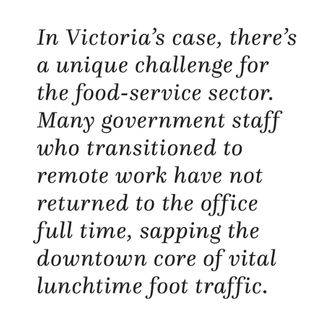 Part of the challenge of such initiatives is getting those consumers to re-engage with the downtown core where many of the best restaurants are located. In Victoria’s case, there’s a unique challenge for the food-service sector. Many government staff who transitioned to remote work have not returned to the office full time, sapping the downtown core of vital lunchtime foot traffic. Large, taxpayer-funded government office space sitting underutilized is an ongoing point of frustration for Jeff Bray, CEO of the Downtown Victoria Business Association.
Part of the challenge of such initiatives is getting those consumers to re-engage with the downtown core where many of the best restaurants are located. In Victoria’s case, there’s a unique challenge for the food-service sector. Many government staff who transitioned to remote work have not returned to the office full time, sapping the downtown core of vital lunchtime foot traffic. Large, taxpayer-funded government office space sitting underutilized is an ongoing point of frustration for Jeff Bray, CEO of the Downtown Victoria Business Association.
“Marketing campaigns aimed at getting people to go out for appies and drinks are fine, but the public needs to feel safe,” says Bray, adding that street disorder, open drug use, theft and violence are prompting more people to stay in the suburbs. Though this social disorder is not a uniquely Victoria problem, Bray says it’s become an existential threat to many of the small-business entrepreneurs he talks to regularly.
In early summer, the City of Victoria gave first reading to a 79-page plan with more than 100 recommendations aimed at addressing a “diminished sense of community safety and well-being.” For many business owners who have been dealing with smashed windows and concerns about employee safety, that’s an understatement. Bray welcomes the proposed plan, but says it’s critical to move quickly.
On one summer weekend, four violent and random assaults in a single day kept police and paramedics busy downtown. An assault left a bike store owner with a broken arm and another individual with a deep cut to the leg from what police called an “edged weapon.”
“We appreciate that the council and the city have heard the needs of business and are moving to take strong action. We urge the provincial government to follow suit on the urgency as many of the issues the city is dealing with fall under provincial jurisdiction,” Bray told Douglas magazine. “The one point we have made to the city and to council, and to which they’ve been very receptive, is that we need to see some short-term improvement in order to build confidence among downtown businesses that indeed things will get better and it’s worth continuing to operate a business and grow a business in downtown.”
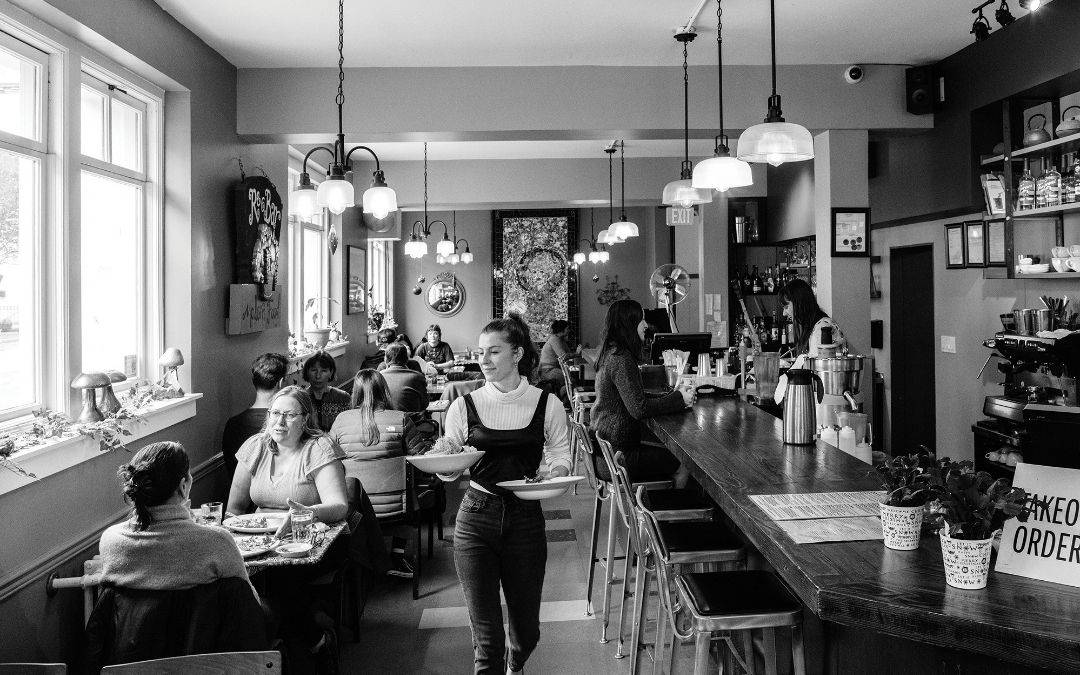
The Right Formula
Robert Belcham is a chef, serial restaurateur and active board member of the Chef’s Table Society of B.C. He started his career more than 30 years ago at Rebar Modern Food, which has stood the test of time on Bastion Square thanks to what Belcham says is a formula of consistently good service and staff, quality food and a great location.
He agrees that the cost of food, real estate and other inflationary pressures are hurting restaurant owners but says these are perennial challenges. Unlike other businesses, restaurants are hyper-reluctant to raise prices even if it means sometimes operating at a loss, because when times are tough “dining out is one of the first things that people cut,” Belcham says.
As someone who has opened more than a dozen restaurants and currently owns or co-owns and operates Monarch Burger and Popina Canteen, both in Vancouver, Belcham has plenty of experience with red tape. He’d like to see governments focusing on two key areas: first, getting out of the way of small business and slashing red tape; and second, getting a grip on crime and public safety.
“Staying open and profitable over the long term is challenging because there will always be new restaurants opening and new dining experiences for people to spend money on,” Belcham says.
When times are good, and a restaurant nails the right formula of service, food, location and style, then it’s one of the most rewarding businesses to be in. You make people happy and send them home feeling like their money was well spent.
Like Sam Harris and Vincent Vanderheide of Vinuel Restaurant Group, Belcham remains bullish about the restaurant business, despite the challenges.
“It’s still getting bums in seats at the end of the day,” he says. “And if you have enough bums in the seats, then there’s no way you’re going to close because you’ll be making money.”

